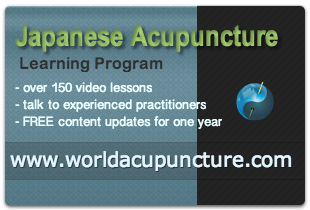Japanese Acupuncture is distinctly different in application from it’s 2nd cousin TCM.
In response to a question posted on the http://worldacupuncture.com forum I am re running this blogpost in an effort to distinguish the difference in the application of Japanese Acupuncture and TCM.
Although each of these styles has merit, Japanese Acupuncture is unique in it’s ability to promote well-being in patients such Sarica, the subject of the video in this blogpost.
I believe the results speak for themselves and maintain that heavy duty needling could deflate a patient in such a tenuous energetic position.
25 years of clinical experience definitely confirms for me that judicious Japanese acupuncture can provide huge impetus towards better health in people of all ages.
There are many examples and in some cases video on this blog of positive clinical outcomes for children of all ages and adults of all shapes and sizes.
http://www.worldacupunctureblog.com/category/clinical/pre-and-post-natal
http://www.worldacupunctureblog.com/category/infant-acupuncture
According to Traditional East Asian medical physiology and philosophy, from conception to birth the child or children require an enormous amount of energy and nourishment from the mother to go from being a twinkle in the eye to a fully mature fetus.
In Traditional East Asian medicine the energetic impetus for this growth is provided by what we call the mothers Kidney energy and in some instances, depending upon her constitution, lifestyle and general health this scenario can cause a significant energetic imbalances in new mums.
In Traditional East Asian medical physiology the Kidneys provide the energetic basis upon which all metabolic and physiological functions depend.
In addition once the child is born a majority of mothers provide the sole nourishment, keeping production up to speed is the responsibility of Spleen/Pancreas meridian/organs.
Hence when there is an imbalance as a result of a combination of any of the above factors the affect can be extremely diverse and widespread.
Often appearing to be totally unrelated from an orthodox Western medical perspective, the symptoms are often intimately related when viewed from an Traditional East Asian medical perspective
In my experience most mums presenting with post natal health difficulties suffer from a significant imbalance in either or both of these functions, an imbalance reflected by various symptoms .
Including:
Post Natal Depression of varying degrees and severity.
Exhaustion.
Irrational fits of anger and an extremely short fuse.
Lactation difficulties, both quality and quantity.
And the list goes on‚
Regarding the suitability of Japanese Acupuncture for infants and children, my experience has shown that our medicine can provide an extremely effective adjunct to orthodox medical care, in many cases providing essential relief where orthodox medical applications are hamstrung in their ability to do so without the use of powerful and sometimes unsuitable medication.
I am not saying that acupuncture can replace pharmaceuticals only that in many instances there is huge potential to reduce dosage and dependence.
I believe all questions are most appropriately answered via clinical outcomes.
The ability to walk the talk not just talk the talk is of the utmost importance.
Certainly any modality that can reduce our culture’s dependence upon long-term medication for behavioral problems has to be a positive!
Below is a video of a significant portion of a Japanese Acupuncture Treatment for Post Natal Depression and Spinal Surgery.
Watch Acupuncture for Post-Natal Depression in Educational | View More Free Videos Online at Veoh.com
Many thanks to Tatania Rubio who specializes in treatment for pregnancy, childbirth and infant acupuncture, for making her clinic space available for this treatment and some excellent camera work!
I recommended Sarica pursue a consistent and committed daily to thrice weekly treatment regime tonifying Ki.3 – Liv.3– GB.40 plus 7 – 9 cones of Tonetskyu or Rice Grain Moxa on ST.36 for the next 6 months.
Below is an email I recently received from Sarica.
I love her dedication and also the power of Japanesel acupuncture to significantly help folk in her situation.
hi there, alan,
so good to hear from you…you’ve been big on my mind, as i’m deep
with appreciation for your help, care and guidance, so i appreciate
your checking in on me. i’ve been faithful with the self-treatment,
including the moxa, and the biggest thing i’ve noticed is that my
brain and spirit are returning. i’d really been struggling with
fighting negativity, and that has improved tremendously. also, my
energy is more sustained, though i’m not pushing too hard with
exercise–just doing about half of what i think i can, and that keeps
me from feeling shaky and overdrawn afterward. finally, i feel like
i have a lot more control over my frustration and anger–i’m not
owned by it as i was, and that is improving my relations with and for
the kids day by day. honestly, i can’t thank you enough :).
how are you? so looking forward to seeing you again–that was too
short! and i do hope to practice with you next time around…
you take care, now!
love,
Sarica
Warning!!! Not every Post Natal Depression patient presents with Liver Yang Deficiency Syndrome in the same way that not every Liver Yang Deficiency Patient presents with Post Natal Depression.
Alan Jansson is an internationally recognized teacher and practitioner of Traditional Japanese Acupuncture. For well over a decade, independent of and in conjunction with Masakazu Ikeda sensei and Edward Obaidey, Alan has presented, convened and hosted more than 40 Traditional Japanese Acupuncture workshops in Australia, New Zealand and USA. Driven by a strong desire to promote the consumer friendly nature, clinical efficacy and potency of Meridian Based Traditional Japanese Acupuncture, Alan is a staunch advocate of practically based workshops and draws upon his 25 years clinical experience and 14 years post and undergraduate teaching in a concerted effort to lift the bar globally in the clinical application of this most amazing medical art.
Join him in Exploring the Art of Acupuncture in the 21st century at http://www.Worldacupuncture.com

Speak Your Mind